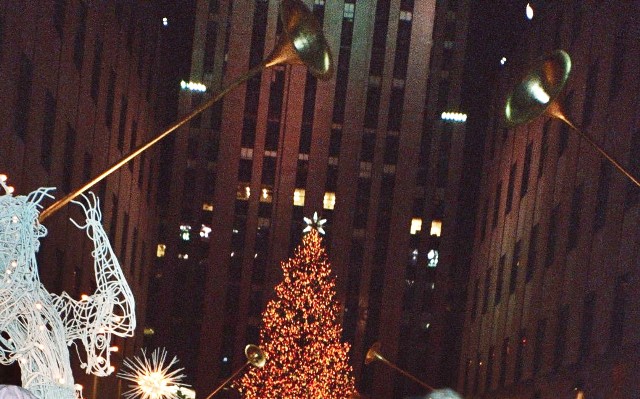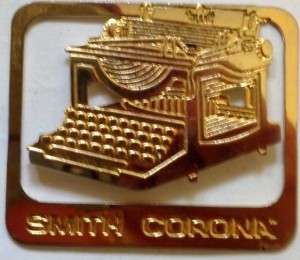What can I say about typewriters? There's a material side and emotional side to my tale:
- The jacket of the Piccadilly-brand journal I opened to write this essay is covered with ink-drawn illustrations of old-fashioned telephones, cameras, typewriters and other desk paraphernalia. One glance at the vintage typewriter images and I carted the journal to the Barnes & Noble checkout counter.
- On the narrow shelf that runs above my computer, I've placed a desk- and-typewriter-shaped ceramic salt and pepper set. I was delighted to find it at a yard sale on Martha's Vineyard, one of my favorite places on earth, locking in pleasant memories to retrieve anytime I notice the pair.
- On the same narrow shelf is a typewriter Christmas ornament on which rests a notepaper that reads, "Peeperback Writer How-to Guide." It's a remnant of a Beatles diorama I created with a team of tech writers for an entry in an IT department "Peeps" contest, definitely a fond memory of a corporate team-building exercise. Peeps are sugar-coated marshmallow candies shaped like chicks. Placed in Easter baskets, they dry to rock hardness. Creative IT geeks use them as contest-building material, at least they did in the 12 years I worked in IT. A Peep sat in front of the typewriter in the Beatles diorama, dried to rock hardness.
- For 20+ years, I've tucked a typewriter-shaped metal bookmark into my annual pocket calendar. The bookmark is stamped with the words "Smith Corona." It is a memento from a job in marketing, one in which I did not accurately decrypt the subtext of the bookmark designer. Still, a lifelong attachment to typewriters outweighed any reminder of that experience. I like my little bookmark and all it represents, which is not in fact - typing.
Ahem
Two of my older sisters excelled at typing - speed demons who took pride in their skill and earned income for their families. Yet, as a teenager, the last skill I ever wanted cited was typing. In my observations, employers who knew you could type relegated you to the typing pool. If you doubt it, watch an episode of the 1960s office drama "Mad Men," and see the rows of "girls" on the job.
Much to the chagrin of a 1960s high school teacher, I never typed beyond the paltry rate of 40-words per minute, and I always looked at the keys. That teacher - a Dominican nun - remained a lifelong friend - ever pointing out with a mother superior lift of the eyebrow - that I've spent my entire adult life at keyboards, probably hundreds of hours more than would be required of a half-decent typist. Ahem.
You Name It, I Lugged It Around
Name the typewriter brand - SC, Royal, Corona, Underwood - IBM - over the years, I owned it. I lovingly set it up on the nearest flat surface - cocktail table, dining room table, desk or picnic table - to fire away.
Given college and grad school papers, poems and freelance articles, I pale at the reams of paper and rolls of ribbon purchased, not to mention the Wite Out and other agents that disguised strikeouts. I treated even hefty electric typewriters with respect, meticulously cleaning a rotating typing ball with cotton soaked in alcohol to at least keep the key strikes snappy.
Never So Free
The introduction of word processors in the 1980s released me from the angst of re-typing - that exasperating necessity most often discovered as I reached the last line or two of a page. With word processors and later with document applications, I excelled as a cut and paste expert. I actually reveled in cut and paste. Could dance a jig over the ability to make changes so easily. And sing the praises of Spellchecker! The only thing better was dictation - that to a professional - as I did over the phone for feature stories for The New York Times in the late 1980s and early 1990s - or in recent years to the nifty Dragon speech- to-text app on my desktop.
Back to the Future
So, it was with mixed emotion I read in the January/February 2015 issue of Poets & Writers that new applications and software features mimic aspects of the typewriters popular between the 1860s to 1970s. An application created by Tom Hanks (the Tom Hanks) recreates the sound, type fonts and appearance of the original machine. It's now possible to compose by tapping typewriter keys and backing up your content to the cloud. Whoa! One device even lets you touch the screen where a virtual Wite Out will delete unwanted characters.
I'm tempted to try it, just for old time's sake. What would it be like to hear the clack of the keys, taunting me to compose another line? Still, a lot appears to be missing from the modern experience. Where's the need for a paper carriage return that ground its gears and always spurred me on? No point sliding in a piece of paper and turning the roller handle to bring the sheet around and snap it into place. All gone.
Having owned those half-dozen typewriter models, I think of them as my version of the vintage sports cars my pilot brother tinkered over in his garage; the same big brother who lent me his Olivetti when I started college.
Hunched over that first typewriter, I confirmed the notion I could stare at the keys and type my own thoughts - not the ideas someone else needed to have typed fast. It has been bliss, being paid to think; though I probably could have more forcefully specified how much I wanted to be paid - as in more.
Awkward
Getting back to one of my early life dilemmas: Two sisters could opt to be offended by my aspirations and a sporty brother backed them. I might have turned a much-loved nose or two out of joint by wanting to be educated beyond what was then deemed the norm for females of our family. Or, I could "miss the basket" when I tried and let down the brother who went so far as to lend me his precious Olivetti portable, purchased in Italy and chockfull of his own driven memories.
Neither happened. Since my early agonizing over ostracism, I came to realize no one cared about my ambitions as much as I did. Not one sibling tried to stop me. There might have been some initial standoffishness, some "Just who do you think you are, Squirt?" But not so much. Whatever flashed through their minds seemed to center on how I could disappear into a far-off new orb, leaving them behind. Never!
With experience, such misgivings fade - as do all anxious content items on life's flickering screen - passing headlines appearing as the human family's evening news - as fast as my mind can type them.









